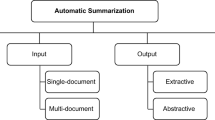Abstract
Document summarization has attracted a lot of research interest since the 1960s. However, it still remains a challenging task on how to extract effective feature for automatic summarization. In this paper, we extract two features called entropy and relevance to leverage information from different perspectives for summarization. Experiments on unsupervised and supervised methods testify the effectiveness of leveraging the two features.
Access this chapter
Tax calculation will be finalised at checkout
Purchases are for personal use only
Preview
Unable to display preview. Download preview PDF.
Similar content being viewed by others
References
Lee, J.-H., Park, S., Ahn, C.-M., Kim, D.: Automatic generic document summarization based on non-negative matrix factorization. Information Processing and Management 45, 20–34 (2009)
Shen, D., Sun, J.-T., Li, H., Yang, Q., Chen, Z.: Document summarization using conditional random fields. In: International Joint Conference On Artificial Intelligence, pp. 2862–2867 (2007)
Conroy, J.M., O’Leary, D.P.: Text summarization via hidden markov models. In: Proceedings of the 24th Annual International ACM SIGIR Conference on Research and Development in Information Retrieval, pp. 406–407. ACM Press, New York (2001)
Aliguliyev, R.M.: A new sentence similarity measure and sentence based extractive technique for automatic text summarization. IExpert Systems with Applications 36, 7764–7772 (2009)
Jones, K.S.: Automatic summarizing: The state of the art. Information processing and Management 43, 1449–1481 (2007)
Shen, D., Yang, Q., Chen, Z.: Noise reduction through summariation for web-page classification. Information Processing and Management 42, 1735–1747 (2007)
Li, L., Zhou, K., Xue, G.-R., Zha, H., Yu, Y.: Enhancing diversity, coverage and balance for summarization through structure learning. In: WWW 2009: Proceedings of the 18th international conference on World wide web, vol. 4825, pp. 71–80. ACM Press, New York (2009)
Mihalcea, R.: Language independent extractive summarization. In: Proceedings of the 20th national conference on Artificial intelligence, vol. 4, pp. 1688–1689 (2005)
Montgomery, D.C., Peck, E.A., Vinin, G.G.: Introduction to linear regression analysis, 2nd edn. Wiley, Chichester (1992)
Huang, G.-B., Zhu, Q.-Y., Siew, C.-K.: Extreme learning machine: A new learning scheme of feedforward neural networks. In: International Joint Conference on Neural Networks 2004, vol. 2, pp. 985–990 (2004)
Matrices, D.S.: Theory and Applications, 1st edn. Springer, Heidelberg (2002)
Lin, C.Y., Hovy, E.: Automatic evaluation of summaries using n-gram co-occurrence statistics. In: Proceedings of the 2003 Conference of the North American Chapter of the Association for Computational Linguistics on Human Language Technology, vol. 1, pp. 71–78 (2003)
Luhn, H.P.: The automatic creation of literature abstracts. IBM Journal of Re- search and Development 2, 159–165 (1958)
Gong, Y., Liu, X.: Generic text summarization using relevance measure and latent semantic analysis. In: Proceedings of the 24th Annual International ACM SIGIR Conference on Research and Development in Information Retrieval, pp. 19–25. ACM Press, New York (2001)
MarcuM, D.: From discourse structures to text summaries. In: ACL 1997 Workshop on Intelligent Scalable Text Summarization, pp.82–88 (1997)
Neto, J.L., Freitas, A.A., Kaestner, C.A.A.: Automatic text summarization using a machine learning approach. In: Bittencourt, G., Ramalho, G.L. (eds.) SBIA 2002. LNCS (LNAI), vol. 2507, pp. 205–215. Springer, Heidelberg (2002)
Rijsbergen, C.V.: Information Retrieval, 2nd edn. Butterworths (1979)
Author information
Authors and Affiliations
Editor information
Editors and Affiliations
Rights and permissions
Copyright information
© 2010 Springer-Verlag Berlin Heidelberg
About this paper
Cite this paper
Luo, W., Zhuang, F., He, Q., Shi, Z. (2010). Effectively Leveraging Entropy and Relevance for Summarization. In: Cheng, PJ., Kan, MY., Lam, W., Nakov, P. (eds) Information Retrieval Technology. AIRS 2010. Lecture Notes in Computer Science, vol 6458. Springer, Berlin, Heidelberg. https://doi.org/10.1007/978-3-642-17187-1_23
Download citation
DOI: https://doi.org/10.1007/978-3-642-17187-1_23
Publisher Name: Springer, Berlin, Heidelberg
Print ISBN: 978-3-642-17186-4
Online ISBN: 978-3-642-17187-1
eBook Packages: Computer ScienceComputer Science (R0)




